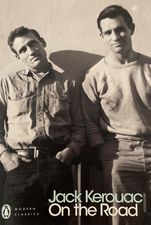By Mollie Campbell
When reading ‘On the Road’, one of my favourite books, it would be incredibly difficult to not feel inspired by it. The way Kerouac narrates his travels, the pure detail of his descriptions, the way he paints a scenic picture so well it is as if we are in his mind, experiencing his own memories. And the way he used brush strokes of words to perfectly build upon foundations of how we view the world, resulting in this marvellous canvas, an eruption of colour on each page. The way he used the nature of his surroundings, transporting us directly into the hazy mornings of San Francisco, or the boiling hot nights under the stars in Mexico City. When I first read the way he describes the beautiful open road, a highway to your own freedom and internal consciousness, a ticket to your very own soul and the opportunity to revel in its richness, spurred on by this immense hunger to explore the world around you, I immediately felt the urge to completely drop everything and start planning my future travels as soon as possible. It resonated with me instantly, just as it did a whole generation in the 50’s and 60’s.
‘On the Road’ released in 1957, was the beginning of the ‘Beat Generation’, a literary movement including works by other authors such as Allen Ginsberg and William S. Burroughs etc. focusing on American culture in the post-war era. The beat poets were instrumental in liberating publishing and writing about issues related to nonconformity, igniting a hunger to do more and think more about life and the world around you. The ‘Beatniks’ manifested into ‘hippies’ and the counterculture of the 1960’s, a movement that changed the fabric of society like we had never seen before, a spirit that has remained within popular culture’s ideals of freedom, equality and justice ever since. Simultaneously, it inspired many of the musicians who were up and coming during this time, artists who went on to become the most famous musicians in history e.g. Bob Dylan, The Beatles, Jim Morrison etc.
The book is responsible for kick-starting a completely different kind of generation, one that had never manifested before, one in which history didn’t determine how people lived… liberating young people instead of forcing them to conform. All of these ideas are passionately woven by every word, resulting in wondrous, rich, dazzling backdrops in so many different geographical lenses and landscapes. Here are some examples of my favourite passages in the book:
‘But why think about that when all the golden land’s ahead of you and all kinds of unforeseen events wait lurking to surprise you and make you glad you’re alive to see?’.
‘The country was wild and brawling and free, with abundance and any kind of freedom for everyone’.
‘What is that feeling when you’re driving away from people and they recede on the plain till you see their specks dispersing? – it’s the too-huge word vaulting us, and it’s good-by. But we lean forward to the next crazy venture beneath the skies’.
‘The cabby drove us up the infinitely dark Alameda Boulevard along which I had walked many and many a lost night the previous months of the summer, singing and moaning and eating the stars and dropping the juices of my heart drop by drop on the hot tar’.
The current younger generation sometimes seem to recognise ‘On the Road’ as culturally significant; it is regarded as a classic, but never seems to appear prominently on ‘vintage’ reading lists in popular culture. Whilst newer generations are aware of the magnitude of the work, it is rarely read (outside of a mandatory curriculum), understood and cherished in modern day. This is puzzling to me, because if you strip away the time frame and the components of a different generation and landscape, you’re left with the most classic and stereotypical tale of all, a rite of passage that will never grow stale… a young person itching to get out of the town they have always known, longing to discover what lies upon the horizon they have been forced to look at in the same place for their whole life. The spark we have as young people finding our place in a world we haven’t yet discovered. It is timeless, inevitable and only natural to want to get away from where we have grown up; many people have a longing to leave their city behind. But there is a flip side to that coin too, just as Sal discovers, the dreams we create and glorify in our heads of the places we want to visit, don’t always turn out the way we envision them, and you usually find yourself needing to return somewhere.
That is the beauty of this book; it’s a brightly burning candle representing the pure ecstasy of travelling and discovering the world and its boundless elements in all walks of life. But it also represents the dimming of that candle as we grow up and start planting roots in the places we have discovered, the message being (in my opinion): that intense burning flame is bound to start dimming, that is only natural, but never let that flame burn out completely, keep the fire lit. Despite mild imperfections in terms of attitudes towards women and certain language we wouldn’t accept today, it’s gritty and fiery essence is still burning throughout the core of the book, seeping into the souls of young adventurers today, just as it did back then.
Thank you for reading and please subscribe. How do you feel about On the Road? Whether you read it a long time ago, or only recently picked it up, I would love to know your thoughts.

